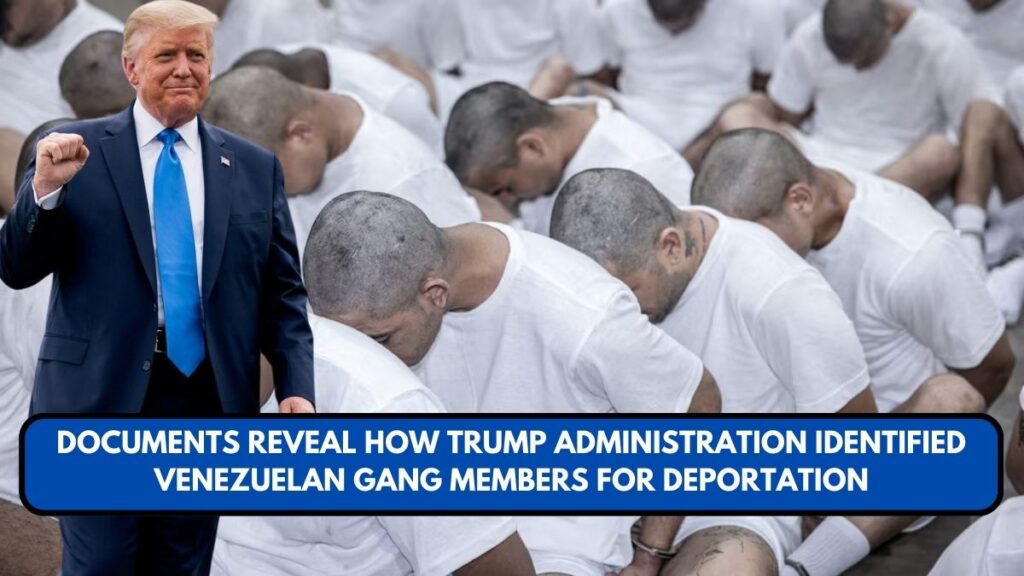The Trump administration’s recent use of the Alien Enemies Act of 1798 to deport Venezuelan migrants suspected of gang affiliation has sparked legal challenges and civil rights outcry.
According to court documents and reporting from multiple outlets, U.S. immigration authorities used a “checklist” to determine potential gang affiliation, leading to the deportation of more than 130 Venezuelans to El Salvador in early 2025.
The American Civil Liberties Union (ACLU) has accused the Department of Homeland Security (DHS) of employing overly broad and unreliable indicators—such as tattoos, hand signs, or mere associations—to justify deportations without due process.
“The government used vague, arbitrary signs as a pretext for deportation,” said a legal spokesperson for the ACLU. “This checklist fails constitutional scrutiny.”
The Law Behind the Deportations

In a controversial move, President Donald Trump invoked the Alien Enemies Act of 1798, originally created during wartime to permit the deportation of nationals from enemy countries.
Trump’s administration argues that Venezuela—under the regime of Nicolás Maduro—poses a national security threat, and that certain migrants have connections to Tren de Aragua, a powerful Venezuelan gang known for violence and transnational crime.
The Tren de Aragua gang has reportedly expanded operations across Latin America, drawing attention from security agencies. However, critics argue that branding individuals as gang members based on appearance or community ties risks sweeping up innocent people.
AP News reported that at least 137 individuals were deported in February and March, most of whom were sent to El Salvador and detained at the country’s controversial Terrorism Confinement Center (CECOT).
The Checklist: A Flawed Tool?
Court filings reviewed by NPR revealed that DHS agents relied on a classified internal document listing signs of gang involvement. These included:
- Having certain tattoos
- Using specific hand gestures
- Being seen with known gang members
- Being from areas known for gang activity
In one reported case, a Venezuelan asylum seeker in Texas was deported based on a tattoo that resembled a gang symbol. His family said he got the tattoo because it “looked cool,” not because of any gang affiliation. The Houston Chronicle interviewed his sister, who called the deportation “a mistake that destroyed our family.”
Legal Pushback and Court Response
On March 25, a federal judge issued a temporary restraining order blocking the deportations, questioning whether the 18th-century law was being misapplied in the immigration context. However, the ruling came after several flights had already taken place.
The ACLU and other human rights groups argue that the Alien Enemies Act is not suitable for modern immigration enforcement. They maintain that deportations must adhere to constitutional protections—including the right to a fair hearing.
“Applying this law to asylum seekers violates the very fabric of due process,” the ACLU wrote in its court filing.
El Salvador’s Involvement
Deporting the individuals to El Salvador, rather than Venezuela, was reportedly based on agreements with Salvadoran authorities.
The detainees were sent to CECOT, a high-security mega-prison known for its harsh conditions and mass incarceration tactics. Rights groups have condemned the prison’s operations, citing lack of legal representation and humane treatment.
Civil Rights Implications

Immigration attorneys and civil society organizations argue that this approach erodes fundamental rights and creates a dangerous precedent for profiling migrants based on race, appearance, or community background.
“This opens the door for future administrations to sidestep due process by labeling people threats without evidence,” said a spokesperson from Human Rights Watch.
For more information on due process and immigration law protections, visit:
This article has been carefully fact-checked by our editorial team to ensure accuracy and eliminate any misleading information. We are committed to maintaining the highest standards of integrity in our content.

Himanshu Sharma writes for Weekend Spy, focusing on recruitment, government schemes, and current affairs. He is dedicated to making complex information accessible to readers.
Himanshu enjoys playing chess, hiking, and trying new recipes, always seeking ways to combine his love for writing with his passion for exploration. Connect with Drop him an email at [email protected].







